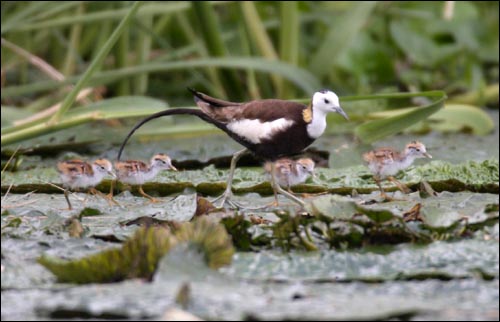Pheasant-tailed Jacana
From Wikipedia, the free encyclopedia
[Photo] Pheasant-tailed Jacana (Hydrophasianus chirurgus) with four chicks, Korea. Date 2007-08-15. Photo by Jongsoo Choi.
The Pheasant-tailed Jacana (Hydrophasianus chirurgus) is a jacana in the monotypic genus Hydrophasianus. Jacanas are a group of waders in the family Charadriidae that are identifiable by their huge feet and claws which enable them to walk on floating vegetation in shallow lakes, their preferred habitat. The Pheasant-tailed Jacana is capable of swimming, although it usually walks on the vegetation. The females are more colourful than the males and are polyandrous.
Distribution
The Pheasant-tailed Jacana breeds in India, southeast Asia, and Indonesia. It is sedentary in much of its range, but northern breeders from south China and the Himalayas migrate into peninsular India and southeast Asia. It is also resident in Taiwan, where it is considered endangered.
Description
This is the only jacana to have a different breeding plumage. The Pheasant-tailed Jacana is a conspicuous and unmistakable bird. They are around 31 cm long, with the females larger than the males. During the breeding season, the long tail adds another 8 cm. The outermost primaries have a spatulate extension of 2 cm and the seventh primary has a broad protrusion.
Breeding adults are mainly black other than white wings, head, and fore neck. The hind neck is golden. There is a striking white eyestripe. The legs and very long toes are grey.
Non-breeding adults lack the long tail. The underparts are white except for a brown breast band and neck stripe. The side of the neck is golden.
Young birds have brown upperparts. The underparts are white, with a weak brown breast band.
Measurements (From Rasmussen and Anderton): length 310 mm 390-580 mm (breeding) Wing (with extension of primary) 190-244 mm (adults) 168-228 mm (juveniles) Bill 23-30 mm Tarsus 45-58 mm Tail 194-376 mm (breeding) 110-117 mm (non breeding)
Breeding
These jacanas breed on floating vegetation from March to July. In southern India, it breeds in the monsoon season, June-September. They are polyandrous and a female may lay up to 10 clutches. Four black-marked brown eggs are laid in the floating nests.
Habits
The Pheasant-tailed Jacana's main sources of food are insects and other invertebrates picked from the floating vegetation or the water's surface.
Their call is a mewing me-onp and a nasal teeun
http://en.wikipedia.org/wiki/Pheasant-tailed_Jacana
| The text in this page is based on the copyrighted Wikipedia article shown in above URL. It is used under the GNU Free Documentation License. You may redistribute it, verbatim or modified, providing that you comply with the terms of the GFDL. |
|

